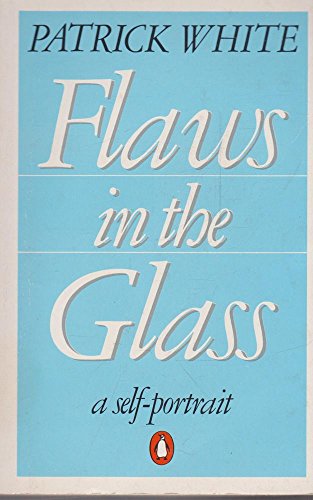
Patrick White was the 1973 recipient of the Nobel Prize in Literature, the first – and of this writing, the only – Australian to win the award, and it was this fame that motivated me to snatch his memoir from a stack of used books, many months ago. I have a special love of biography, autobiography and memoir, especially when the subject is a writer, perhaps because I hope that somehow the writer was latent in the child, that a life can be reverse-engineered in a such a way as to provide a kind of instruction manual for fellow aspirants. Alas, it was not to be: Flaws In The Glass is well-written – at times, superbly written – but poorly planned, almost as if White were offering it up reluctantly: the biographical details are sparing when most wanted, and most forthcoming when least relevant. The resulting book is a tease, tantalizing us with information it ultimately declines to share, and thereby robbing the entire narrative – the life of an openly gay man in the early-mid 20th century, of a successful writer achieving global recognition, or simply the story of a man destined to disappoint his stuffy bourgeois parents – of dramatic weight.
White’s life begins in London, but within six months his family returns to their native Australia, where they are prosperous landowners. From a very young age, Patrick’s parents give him the sense that he is a disappointment to them – not the rugged patrician son they wanted but an effete poet, too sensitive to serve their needs: “My parents were very disturbed by having a delicate son on their hands. […] They needed me to give them a sense of their own continuity by inheriting my share in a consider sheep-and-cattle station.” Patrick’s mother emerges as a stern figure, the one to wield the whip when discipline was called for, while his father, “small and mild,” recedes from our view, and from Patrick’s. “I was a dutiful son,” he tells us, “if not the kind they would have chosen, some doctor-grazier, cricketer-barrister, or my mother’s version of a diplomat; we were all three guilty and innocent parties, suffering one of those betrayals by fate.” Later, condensing his entire relationship with his mother, he will reflect: “Except when a little child, I don’t think I loved, only admired her after a fashion, until I pitied an old bedridden, half-blind senile woman, and pity is a pinchbeck substitute for love.” From that moment on, he will refer to his parents by their first names, Ruth and Dick: “I might have loved Dick had I dared, and had we been able to talk to each other.” There is pathos here, obviously, and a more determined writer might have mined it to great effect, but these terse declarations are characteristic of what White gives us; always there remains the sense that more has been left unsaid.
He is more forthcoming on the subject of writing and imagination, which became, for him, two escapes from a family environment that was by turns neglectful and boring. “Surrounded by a vacuum, I needed a world in which to live with the degree of intensity my temperament demanded.” But his withdrawal into books and scribbling only exacerbated his parents’ sense that he was unlike them: “An artist in the family tree was almost like a sodomite; if you had one you kept him dark.” Consider that a bit of black humour, for in writing that sentence, Patrick knows full well that he is also, in his parents’ phrasing, a “sodomite,” and therefore doubly estranged from them. In his telling, his homosexuality heightened his artistic sensitivities. “The repression society demands of homosexuals obviously reduces them to some extent as members of that society, but if we can quench our fears the perception gained through our temperament strengthens our hand as man, woman, artist, whichever it may be – or all in one.” If this is the case, it is a repression that been potent indeed, for he declines to share much in the way of detail about his life as a gay man: neither what his family think about the decades he spends cohabiting with his partner, or what his neighbours think. Even that partner, presumably the love of his life, hardly comes into view for the reader.
Flaws In The Glass is memoir as reportage, heavy on anecdote and the mundane details of a life well-lived, but ultimately too clinical to be gripping. Turning the final page, we confirm what White has been telling us all along: that we are better off looking for him in his fiction – in the world of his imagining – than in life itself.